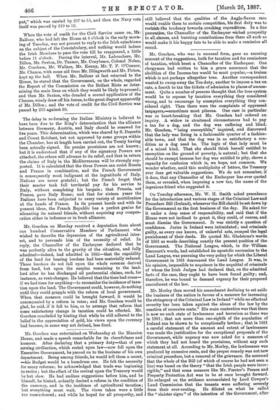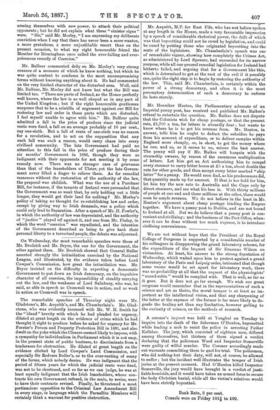Mr. Morley then moved his amendment declining to set aside
the business of the nation in favour of a measure for increasing the stringency of the Criminal Law in Ireland "while no effectual security has been taken against the abuse of the law by the exaction of excessive rents." His main contention was that there is now no such state of lawlessness and terrorism as there was in 1881; that not more than one-eighth of the population of Ireland can be shown to be exceptionally lawless ; that in 1881 a careful statement of the amount and extent of lawlessness was made the justification for the exceptional proposals of the Government, while urgency was now asked for a measure of which they had not heard the provisions, without any such statement at all. According to Mr. Morley, the lawlessness was produced by excessive rents, and the proper remedy was not new criminal procedure, but a removal of the grievance. He assumed that the whole of the Bill (of which of course he had not seen a line) was based on the theory "that the Irish people were incor- rigible," and that some measure like Mr. Forster's Person and Property Protection Act was to be at once brought forward. He enlarged on the evidence accumulated by Lord Cowper's Land Commission that the tenants were suffering severely from their over-renting. He dilated on what he called the "sinister signs" of the intention of the Government, after arming themselves with new power, to attack their political opponents ; but he did not explain what these "sinister signs" were. " Sir," said Mr. Morley, " I am expressing my deliberate conviction.when I say that there has never been a more wanton, a more gratuitous, a more unjustifiable resort than on the present occasion, to what my right honourable friend the Member for Birmingham once called the ever-failing and ever- poisonous remedy of Coercion."















































 Previous page
Previous page